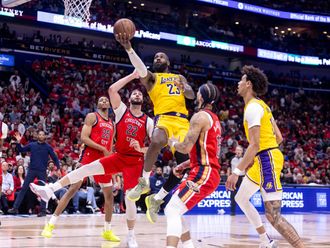Kingston: Jamaican sprinters Asafa Powell and Sherone Simpson have settled a legal case with a nutrition company that sold the supplement Epiphany D1, which contained the banned substance oxilofrine, their management company said on Tuesday.
Two years after testing positive for the stimulant, Powell and Simpson have reached an out-of-court settlement with Dynamic Life Nutrition LLC, according to a news release.
Details of the settlement were not disclosed. Efforts to contact the supplement company for independent confirmation were unsuccessful.
The Jamaican pair tested positive for oxilofrine in June 2013 and got 18-month bans, which were later reduced on appeal to six months by the Court of Arbitration for Sport (CAS).
Powell and Simpson, both Olympic relay champions, sued the company for $8 million (Dh29.3 million) after independent laboratory tests revealed that there were “ingredients in the product (Epiphany D1) that were not listed on the label”.
Despite the settlement, Powell, 32, remains disappointed by what he says is the damage done to his reputation by the positive test.
“There is no way to really explain the kind of damage a ban has on an athlete’s reputation,” said the former world record holder in the 100 metres. “There’s no doubt that we’re going to continue the fight to repair it and regain the trust of my fans and fans of the sport.”
Simpson, a three-time Olympian, added that, while the process had been time-consuming, it had not affected them on the track and they were now cautious on what they took.
“We have a very capable team, and both of us are now extra careful about our diets and supplement regimen,” she said.
The sprinters had testified in an anti-doping disciplinary hearing in Jamaica and a CAS appeal that they took Epiphany D1 as part of their training regimen, but later found out that the supplement contained the banned stimulant oxilofrine.
Powell and Simpson faced a lengthy anti-doping hearing in Jamaica, forcing them to miss the 2013 world championships in Moscow, before both were suspended from athletics for 18 months.
Their sanctions were later cut to six months after CAS found they did not know the stimulant was present in Epiphany D1.
Epiphany D1 has since been placed on the US Anti-Doping Agency (USADA) high risk supplement list, warning athletes to avoid the product.












